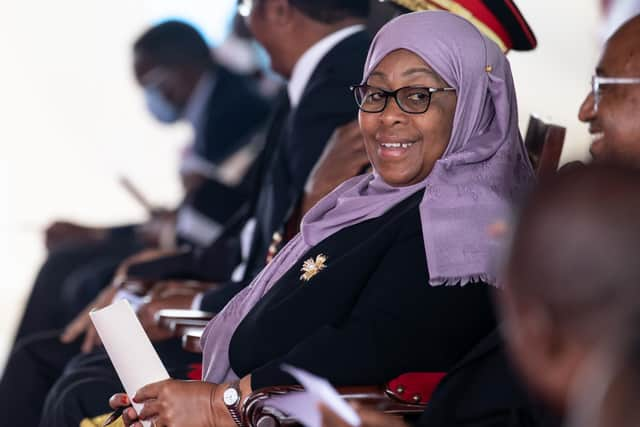High Covid death rate among Africa's leaders is having a political effect – Jean-Benoit Falisse


Covid-related mortality rates for government ministers and heads of state around the world have, our findings show, been substantially higher than that of the general population.
Nowhere is this more true than in Africa, where we found the mortality rate of political leaders to have been substantially higher than that of the general population.
Advertisement
Hide AdAdvertisement
Hide AdBetween 6 February 2020 and 6 February 2021, Covid claimed the lives of at least 24 national ministers and heads of state, a figure well in excess of the in-office death rate in recent years.
Some 17 of these deaths were from the African continent, and the count has kept growing after 6 February. That has put the Covid death rate at 1.33 per cent among ministers and heads of states, up to eight times higher than among the general population of similar age and gender.
In Democratic Republic of the Congo, despite there being relatively low reported cases and death, the virus has so far killed 32 members of parliament, about five per cent of the total.
Perhaps we should not be surprised. High-level politicians are likely to be exposed to the virus more often than the average citizen. They are in close contact with many people from diverse groups, some of whom are also at high risk. They tend to travel a lot, and much of their work is difficult to switch to online.


Yet, given these occupational risks exist in all countries, further explanation is needed.
One possibility is that African leaders are more likely to exhibit Covid co-morbidities, but the evidence to support this is limited. Diabetes and obesity are more frequent among wealthy African individuals with a high level of education, but this is also the case in Asia.
A second hypothesis focuses on healthcare provision, which is typically chronically under-resourced. Many leaders turn to higher-income African countries or private clinics in Asia or Europe, but all the African ministers who died of Covid did so in their own countries.
A third possibility is that mortality in the general population is higher than reported. The extremely high case-fatality rate we compiled using publicly available data does suggest under-reporting of positive cases, perhaps associated with relatively low levels of testing.
Advertisement
Hide AdAdvertisement
Hide AdA fourth reason is that ministers are more susceptible because their working lives are busier and more prone to the circulation of the virus. This, however, is a weak hypothesis in the absence of comprehensive comparative data on ministerial cultures across continents.
Finally, a fifth factor is at play. No fewer than nine of the 17 deaths are in southern Africa (South Africa eSwatini, Zimbabwe and Malawi) and eight of them occurred after the so-called ‘South African’ variant, which is more transmissible, was first reported.
So, how might these high-profile deaths shape health policy and, even, democracy?
The political transitions they prompted, guided by well-established procedures, have been smooth yet the impact on public policy has been significant, especially in countries where the pandemic response had initially been contentious or minimal.
In Malawi, where the country’s high court had blocked lockdown measures in April 2020, the death of Lingson Belekanyama, minister of local government and rural development, was used by president Lazarus Chakwera to stress the importance of new restrictions.
In Burundi, the death of president Pierre Nkurunziza in June 2020 prompted a swift change by the previously dismissive authorities. Within three weeks, the new president, Evariste Ndayishimiye, declared Covid as Burundi’s biggest enemy and a screening drive followed.
Tanzania’s president John Magufuli made global headlines for minimising the danger of Covid but, following the death of his chief secretary John Kijazi in February, the president finally urged citizens to wear masks. These events were soon overtaken by his own death.
Now, early in new president Samia Suluhu Hassan’s tenure, there are indications of further changes to the country’s Covid policy, including new treatment guidelines.
Advertisement
Hide AdAdvertisement
Hide AdElsewhere, countries that already had strong Covid responses in place, such as Zimbabwe, Niger or Senegal, saw no substantial changes to health policies following ministerial deaths.
Ministerial deaths mean changes at the top, but the passing of the baton to a younger, more gender-representative cohort seems unlikely, with Tanzania’s president Samia the notable exception. The number of fatalities has been too low to have such a catalytic effect and, as Zimbabwe shows, there are many more politicians, with similar profiles, waiting to fill gaps.
That said, there may be a shift in how government business is transacted. The image of apparently indestructible leaders has been tarnished as they disappear from view, though none of the longest-lasting presidents have yet succumbed to the virus.
It now seems probable that greater responsibility will fall to deputies and junior ministers. The disconnect between leaders, the rest of the government apparatus and the wider public is therefore likely to increase. Junior ministers may be somewhat younger and, in many countries, women occupy these positions more frequently than senior positions.
The death of a significant number of opposition politicians, also highly itinerant and interactive with many people, could mean fewer are prepared to challenge government.
The same can be said for lawyers, academics and other public figures who, in many African countries, are key to ensuring political checks and balances. These groups have already suffered major casualties in countries such as Zimbabwe, Tanzania and Nigeria.
African lawmakers across the political spectrum are aware many of their number are being lost to the pandemic, and most African countries are calling for an accelerated rollout of foreign-made vaccines. Some political elites are rumoured to have had privileged access to vaccines, which, if true, suggests they are not sceptical about immunisation. This may be important for leaders acting as role models when further vaccines become available.
Jean-Benoit Falisse is lecturer in African studies and international development at Edinburgh University
A message from the Editor:
Thank you for reading this article. We're more reliant on your support than ever as the shift in consumer habits brought about by coronavirus impacts our advertisers.
If you haven't already, please consider supporting our trusted, fact-checked journalism by taking out a digital subscription.
Comments
Want to join the conversation? Please or to comment on this article.
